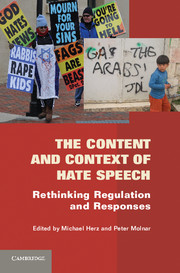Book contents
- Frontmatter
- Contents
- Contributors
- Foreword: Hate Speech and the Coming Death of the International Standard before It Was Born (Complaints of a Watchdog)
- Foreword: Hate Speech and Common Sense
- Acknowledgments
- Introduction
- Part I Overviews
- 1 Interview with Robert Post
- 2 Is There a Case for Banning Hate Speech?
- 3 Hate Speech
- 4 Interview with Kenan Malik
- 5 Hate Speech and the Demos
- 6 On American Hate Speech Law
- Part II Refinements and Distinctions
- Part III Equality and Fear
- Part IV International Law
- Index
- References
6 - On American Hate Speech Law
Published online by Cambridge University Press: 05 June 2012
- Frontmatter
- Contents
- Contributors
- Foreword: Hate Speech and the Coming Death of the International Standard before It Was Born (Complaints of a Watchdog)
- Foreword: Hate Speech and Common Sense
- Acknowledgments
- Introduction
- Part I Overviews
- 1 Interview with Robert Post
- 2 Is There a Case for Banning Hate Speech?
- 3 Hate Speech
- 4 Interview with Kenan Malik
- 5 Hate Speech and the Demos
- 6 On American Hate Speech Law
- Part II Refinements and Distinctions
- Part III Equality and Fear
- Part IV International Law
- Index
- References
Summary
Introduction – First Principles
So often has the constitutional protection afforded to “hate speech” by the First Amendment to the U.S. Constitution been contrasted with more restrictive laws in other democratic societies, that it may be useful to offer a bit of context to the American approach. Consider two U.S. Supreme Court decisions from 2010 in what may seem to be unrelated areas.
The first is United States v. Stevens, which held unconstitutional under the First Amendment a federal statute that criminalized the commercial creation, sale, or possession of “a depiction of animal cruelty.” Seeking to persuade the Court to affirm the constitutionality of the statute, the United States proposed a novel legal test, one never before adopted by American courts. As the Court summarized the government's position, it urged “that a claim of categorical exclusion [from the First Amendment] should be considered under a simple balancing test.” The test was “[w]hether a given category of speech enjoys First Amendment protection depends upon a categorical balancing of the value of the speech against its societal costs.”
- Type
- Chapter
- Information
- The Content and Context of Hate SpeechRethinking Regulation and Responses, pp. 116 - 126Publisher: Cambridge University PressPrint publication year: 2012
References
- 4
- Cited by

